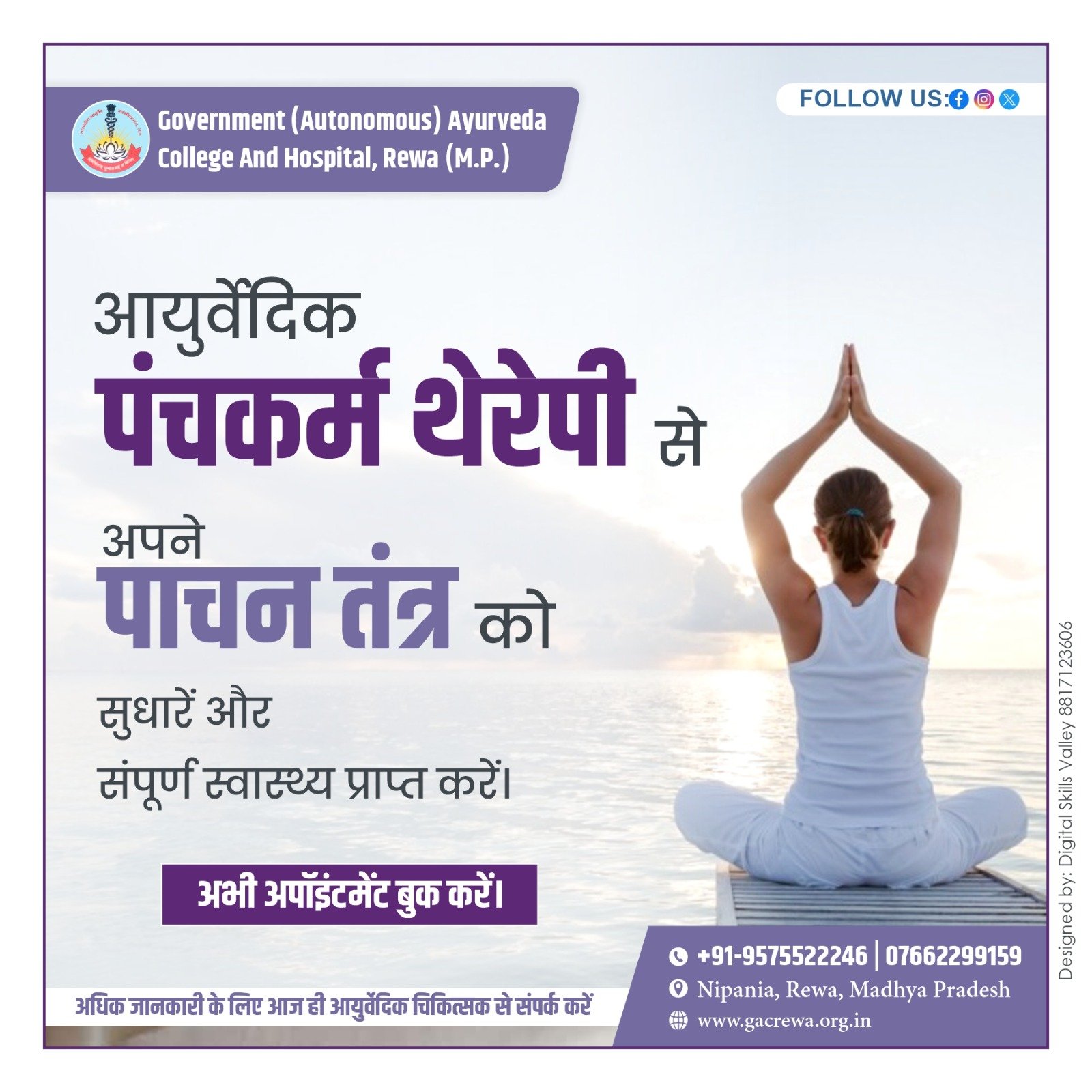Ayurvedic Panchakarma Therapy for Digestive Health
Introduction
In today’s fast-paced world, maintaining optimal health can often take a backseat to our hectic schedules and demanding lifestyles. One area that particularly suffers is our digestive health. From irregular eating habits to stress-induced digestive issues, it’s no wonder that many people are seeking holistic approaches to restore balance. Ayurvedic Panchakarma therapy, offered by the Government (Autonomous) Ayurveda College and Hospital in Rewa, Madhya Pradesh, stands out as a time-honored and effective solution to rejuvenate the digestive system and achieve overall well-being.
What is Panchakarma Therapy?
Panchakarma is a cornerstone of Ayurveda, the ancient Indian system of medicine. The term “Panchakarma” translates to “five actions” or “five treatments,” referring to five detoxification procedures designed to cleanse the body of toxins, restore doshic balance, and improve bodily functions. These procedures are:
- Vamana (Therapeutic Emesis): Inducing vomiting to eliminate toxins from the stomach and respiratory tract.
- Virechana (Purgation): Using herbal laxatives to cleanse the intestines.
- Basti (Enema): Administering herbal decoctions or oils through the rectum to cleanse the colon.
- Nasya (Nasal Administration): Instilling herbal oils or powders into the nostrils to clear nasal passages and sinuses.
- Raktamokshana (Bloodletting): Detoxifying the blood, though this is less commonly practiced today.
These therapies work synergistically to detoxify the body, enhance digestion, boost immunity, and promote overall health.
The Importance of Digestive Health
In Ayurveda, the digestive system, or Agni (digestive fire), is considered the cornerstone of good health. A strong Agni is essential for proper digestion, absorption of nutrients, and elimination of waste. When Agni is weak or imbalanced, it can lead to various digestive issues such as indigestion, bloating, constipation, and malabsorption of nutrients, which can further cause systemic health problems.
Panchakarma Therapy for Digestive Health
Panchakarma therapy at the Government (Autonomous) Ayurveda College and Hospital in Rewa is tailored to enhance digestive health. Here’s how each component of Panchakarma can help:
- Vamana (Therapeutic Emesis): This procedure helps in clearing out the stomach and respiratory tract, effectively treating issues like chronic indigestion, asthma, and congestion. By removing toxins from the upper digestive tract, Vamana rejuvenates the digestive system and promotes better digestion and absorption.
- Virechana (Purgation): Virechana focuses on the small intestine and liver. It is particularly effective for Pitta-related disorders, which include hyperacidity, gastritis, and inflammatory bowel diseases. By purging the intestines, Virechana helps in resetting the digestive system and ensuring smooth digestion and nutrient assimilation.
- Basti (Enema): Known as the mother of all treatments in Ayurveda, Basti is highly beneficial for Vata disorders, which often manifest as constipation, bloating, and irregular bowel movements. By administering medicated enemas, Basti helps in softening and expelling accumulated waste, thus promoting a healthy and regular digestive system.
- Nasya (Nasal Administration): While Nasya is primarily used for respiratory and neurological health, it also indirectly benefits digestion. By clearing the nasal passages and improving respiratory function, Nasya ensures adequate oxygen supply to all body parts, including the digestive organs, thus enhancing their function.
- Raktamokshana (Bloodletting): Though less commonly used, Raktamokshana helps in detoxifying the blood and improving circulation. This ensures that the digestive organs receive pure, nutrient-rich blood, thus enhancing their efficiency.
Why Choose Government (Autonomous) Ayurveda College and Hospital, Rewa?
Choosing the right place for Panchakarma therapy is crucial for its effectiveness and safety. The Government (Autonomous) Ayurveda College and Hospital in Rewa, Madhya Pradesh, offers several advantages:
- Expert Practitioners: The hospital boasts a team of experienced and certified Ayurvedic doctors and therapists who ensure that treatments are personalized and conducted with the highest standards of care.
- State-of-the-Art Facilities: Equipped with modern facilities while maintaining traditional Ayurvedic practices, the hospital ensures a comfortable and effective therapeutic experience.
- Holistic Approach: The treatments are designed not only to address the symptoms but also to target the root causes of digestive issues, ensuring long-term health benefits.
- Affordable Care: As a government institution, the hospital provides high-quality Ayurvedic treatments at affordable rates, making it accessible to a broader population.
How to Get Started
Getting started with Panchakarma therapy at the Government (Autonomous) Ayurveda College and Hospital is straightforward. Here are the steps:
- Consultation: Book an appointment for a consultation with an Ayurvedic doctor. During this session, the doctor will assess your health condition, dosha balance, and specific digestive issues.
- Personalized Treatment Plan: Based on the consultation, the doctor will create a personalized Panchakarma treatment plan tailored to your needs.
- Therapy Sessions: Undergo the recommended Panchakarma procedures. Each session is conducted under the supervision of expert therapists to ensure safety and effectiveness.
- Post-Therapy Care: Follow the post-therapy guidelines provided by your doctor to maintain the benefits of the treatment and support your digestive health.
Contact Information
For more details or to book an appointment, you can contact the Government (Autonomous) Ayurveda College and Hospital in Rewa through the following channels:
- Phone: 9575522246
- Address: Nipaniya Rd, Pushpraj Nagar, Madhya Pradesh 486001
- Website: www.gacrewa.org.in
- Email: kulshresthad63@gmail.com
Conclusion
Ayurvedic Panchakarma therapy offers a holistic and effective approach to improving digestive health and achieving overall wellness. By choosing the Government (Autonomous) Ayurveda College and Hospital in Rewa, you can benefit from expert care, state-of-the-art facilities, and a personalized treatment plan that addresses your unique health needs. Take the first step towards better health today by booking an appointment and embarking on a journey to rejuvenate your digestive system and enhance your quality of life.


